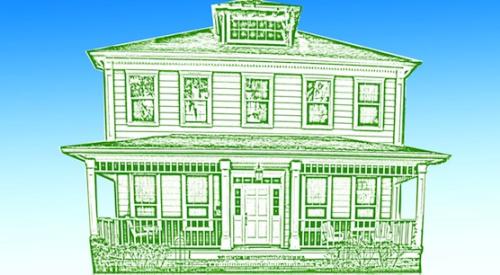|
 |
Meet Shannon and Jeanpaul Ippolito. At 31 and 34, respectively, they are the textbook definition of an entry-level buyer. They recently married, and they both work and are getting ready to move to their next phase of life: buying a house.
The Ippolitos are like many couples in that they rented an apartment after their nuptials and planned to live in it until they outgrew the space. While the one bedroom was cozy at first, one bathroom, a small kitchen, no yard and the can't-paint-the-walls policy have officially overstayed their welcome.
"Being newly married, we want to ensure we are in an OK place financially speaking before purchasing our first home," says Shannon. She's not alone. Like many 20- and 30-somethings, college loans and a less-than-stellar post-college job market left her and her husband both with several financial burdens.
Most of your entry-level buyers are not going to be entrepreneurial sensations with six-figure incomes. An even more likely scenario is that your entry-level buyer will be coming from a rental — or even mom and dad's basement — rather than a home they own. Your entry-level buyer may not be pre-approved nor have ever owned anything as expensive as a home.
In a June 2007 Housing Giants article, real-estate analyst and HG columnist John Burns urged home builders to readjust their targets from entry-level buyers to move-up buyers because entry-level buyers appear to be tapped out.
"The pent-up demand among entry-level buyers is very low because those with down payments and those who can qualify at today's prices are not plentiful," says Burns.
Little money and no previous experience or collateral almost sound like a recipe for disaster.
Quite the contrary, say some home builders. Take Midwestern builder Triton Homes. The Clive, Iowa-based home builder provides on-site mortgage agents and uses preferred partnerships to help educate its 24- to 34-year-old buyers.
Social networking for home buyers? While we haven't gone that far — yet — the idea may not be that far off gauging by the Internet usage of the entry-level buyer.
Coming in at the late-20 to mid-30 year-old range, entry-level buyers have nearly grown up with the Internet. It's nothing for them to Google a home builder prior to setting foot in the sales center, if they even get that far.
In 2006, the Pew Internet & American Life Project conducted a study of online activities as they relate to looking for a place to live. The study concluded that at least 51 percent of 18–29 year-olds have searched for housing online while at least 43 percent of 30–49 year-olds have used the Internet to find a home. The study also found that younger buyers tend to take advantage of online offerings with at least 51 percent doing virtual tours if offered.
Tony Holman, 31, another entry-level buyer we talked to, says he won't even consider visiting a builder if they don't list their pricing on their Web site.
In the Ippolitos' case, friends and family have plied them with builder referrals and horror stories, yet they find themselves looking to J.D. Power & Associates' Web site to seek out the names of local builders. They'll check the builder's ratings before going to the builder's Web site. If they like what they see on the Web site, then it's off to the sales center.
Jeff Bramble, Triton's COO, reminds that despite spending more time online prior to entering the sales center, entry-level buyers are less informed about the buying process.
So what does that mean for home builders? Show your Web site some love:
- Enhance your search engine optimization so you're easier to find on Google, Yahoo! and MSN.
- Consider adding virtual tours, price lists and an entry-level-friendly frequently asked questions section to your site.
- Host homeowner blogs. Ask entry-level homeowners to blog about their experiences as a resident of your community.
Need inspiration? Take a look at Triton Homes' Web site. They not only get their market, they exercise their online options as well.
When traditional advertising didn't work, Bramble, the COO, and Joel Goodman, president and CEO, say they turned to referrals via blogs, MySpace and YouTube. Now they've been referred to as one of the Midwest's fastest growing home builders.
 |
"Generation X is cheap and practical — they're price comparers," says author and generation expert Penelope Trunk.
Unlike their baby boomer parents who traded in modest for McMansion, Generation X and the Echo Boomer buyers — the generations that make up the entry-level profile — don't build homes to show off their power and prestige. "They pay for experiences rather than things," says Trunk.
To get sales with such a crowd, Trunk is blunt: "Turn a house into an experience." Forget grand entryways and dining rooms that only get used once a year. Adapt your floor plans: convert the formal living room into an office, make the kitchen larger and add in more organization-friendly features like an electronics nook in the kitchen or bike racks in the mudroom.
Jeffrey Mulcrone, director of design for BSB Design in Palatine, Ill., has noticed a 3-S trend for entry-level buyers: simpler, smaller and smarter.
Entry-level buyers don't want or need the ladies' only powder room on the mezzanine level. They prefer the simple and smaller 2 bedroom, 1.5 bathroom abode they can use to entertain. Having many rooms isn't necessary, says Mulcrone.
Mulcrone advises designing the house so multiple rooms can have different functions, adding, "A smart home uses more of an open floor plan to multi-task all the spaces."
The bottom line has come down a bit thanks to a downward trend in square footage that has made entry-level product more affordable to build. Ditch the expansive master suites; your entry-level buyer would rather have a "kitchen they can host a party in," says Mulcrone.
| Groups of Internet users | Have ever looked online | Looked online yesterday |
| Total Internet users | 39% | 5% |
| Men | 38% | 7% |
| Women | 40% | 4% |
| Age 18–29 | 51% | 9% |
| Age 30–49 | 43% | 5% |
| Age 50–64 | 27% | 3% |
| Age 65+ | 15% | 1% |
| High school graduate | 34% | 5% |
| Some college | 38% | 3% |
| College graduate or more | 46% | 7% |
| Live in households earning less than $30,000 | 43% | 5% |
| $30,000–$49,999 | 42% | 8% |
| $50,000–$74,999 | 32% | 4% |
| $75,000 or more | 45% | 6% |
| 3 years or less of online experience | 23% | 1% |
| 4–5 years of online experience | 30% | 2% |
| 6+ years of online experience | 45% | 7% |
| Dial-up connection at home | 30% | 4% |
| Broadband connection at home | 45% | 6% |
| Source: Pew Internet & American Life Project | ||
|
||||||||||||||||||||













